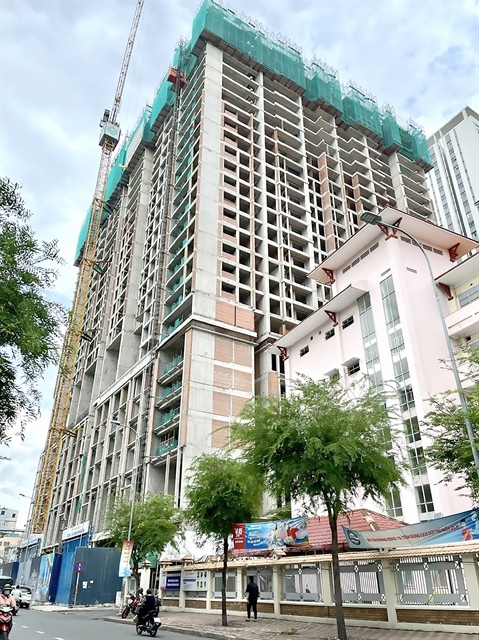|
Businesses under pressure to sell assets, real estate projects to settle debts
Businesses, particularly property developers, are under pressure to sell off assets and real estate projects to settle their debts, including bond repayments and bank loans.

Construction of an apartment complex in District 1 in HCM City stopped at the end of last year. — VNS Photo Bồ Xuân Hiệp
|
Many of them have already announced plans to sell properties as part of their debt restructuring strategies.
The trend has been on the rise so far this year, with many real estate firms looking to repay their debts during their annual general meetings.
LDG Investment (LDG) has announced plans to sell two projects: the Bãi Bụt - Sơn Trà beach resort in Đà Nẵng city and an apartment complex in Bình Dương province’s Dĩ An city.
The Bãi Bụt - Sơn Trà beach resort, which covers an area of 29 hectares with a total investment of over VNĐ4.6 trillion, is one of LDG’s key strategic projects.
The company had explored the possibility of finding partners to invest with a 50-70 per cent stake. However, LDG’s leaders said that this was unlikely in the current real estate market.
Similarly, Hải Phát Investment Corporation recently announced the successful sale of its capital contribution in commercial land use rights at a commercial project in Nha Trang city.
The development adjacent to Trần Phú Bridge and the mouth of the Cái River where it flows into the sea consists of three 40-storey towers with three commercial floors, 10 hotel floors, and 27 apartment floors.
It also plans to sell other real estate projects in the northern provinces of Lào Cai, Bắc Giang, and Quảng Ninh.
Hoàng Anh Gia Lai group recently announced its plan to sell one of its last prime assets. A hotel in Pleiku city in the Central Highlands province of Gia Lai Province will be sold in order to settle its bond debt.
Phạm Đức Toàn, a seasoned professional in brokerage and real estate development, said the main driver behind the trend is the lack of revenue for many businesses since the beginning of the year. To stay afloat, they are resorting to selling assets and projects.
However, liquidity remains a significant challenge, as potential investors are wary of investing due to financial uncertainties, he added.
In addition, the prices of most real estate projects remain too high, and many of them encounter legal obstacles related to land use rights and other legal matters.
A director of a Hà Nội-based real estate company, who wanted to remain unidentified, said it typically takes six month to a year to finalise the sale of projects.
According to the director, while companies still have assets and projects to offer for sale, many smaller real estate firms have already closed due to financial constraints.
Bond repayment crisis
According to a report by VNDirect, corporate bonds worth nearly VNĐ273 trillion will mature this year, mostly in the last two quarters.
The report also stated the amount of maturing bonds from real estate developers will be VNĐ65.9 trillion in the second half of this year and over VNĐ124 trillion in 2024.
To address the issue, the government in March issued a regulation allowing companies to use other assets to make bond payments if approved by debtholders.
The regulation, along with the extension of debt maturities, has provided much-needed breathing space for issuers.
As a result, more than VNĐ42 trillion ($1.77 billion) worth of corporate bonds were rolled over in the second quarter.
The market experienced a surge in 2020 and 2021, with issuances rising to VNĐ462 trillion and VNĐ658 trillion, respectively, according to data from the Việt Nam Bond Market Association.
The boom was largely driven by increased capital demand from property developers and banks, but the property market collapsed and many issuers faced trouble following investigations into bond issuance and improper capital use by several large firms and related arrests in the middle of last year.
As of the end of August, the number of dissolved real estate firms had increased by over 30 per cent year-on-year, according to a report by the Ministry of Construction.
Bizhub
|